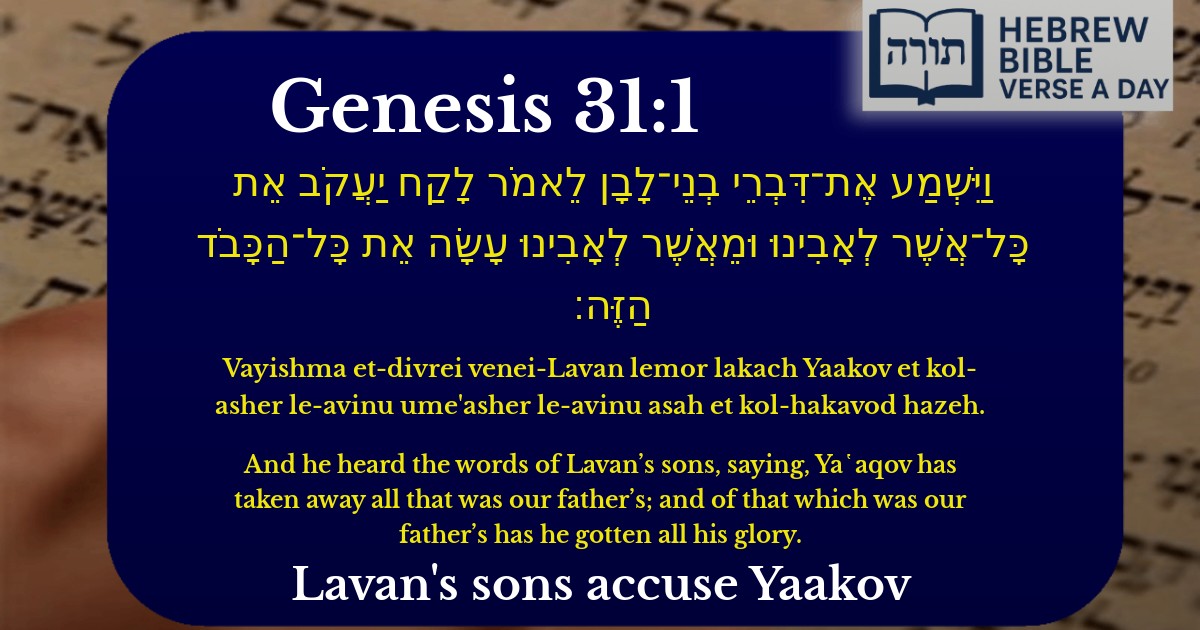Join Our Newsletter To Be Informed When New Videos Are Posted
Join the thousands of fellow Studends who rely on our videos to learn how to read the bible in Hebrew for free!
Hebrew Text
וַיִּשְׁמַע אֶת־דִּבְרֵי בְנֵי־לָבָן לֵאמֹר לָקַח יַעֲקֹב אֵת כָּל־אֲשֶׁר לְאָבִינוּ וּמֵאֲשֶׁר לְאָבִינוּ עָשָׂה אֵת כָּל־הַכָּבֹד הַזֶּה׃
English Translation
And he heard the words of Lavan’s sons, saying, Ya῾aqov has taken away all that was our father’s; and of that which was our father’s has he gotten all his glory.
Transliteration
Vayishma et-divrei venei-Lavan lemor lakach Yaakov et kol-asher le-avinu ume'asher le-avinu asah et kol-hakavod hazeh.
Hebrew Leining Text
וַיִּשְׁמַ֗ע אֶת־דִּבְרֵ֤י בְנֵֽי־לָבָן֙ לֵאמֹ֔ר לָקַ֣ח יַעֲקֹ֔ב אֵ֖ת כׇּל־אֲשֶׁ֣ר לְאָבִ֑ינוּ וּמֵאֲשֶׁ֣ר לְאָבִ֔ינוּ עָשָׂ֕ה אֵ֥ת כׇּל־הַכָּבֹ֖ד הַזֶּֽה׃
וַיִּשְׁמַ֗ע אֶת־דִּבְרֵ֤י בְנֵֽי־לָבָן֙ לֵאמֹ֔ר לָקַ֣ח יַעֲקֹ֔ב אֵ֖ת כׇּל־אֲשֶׁ֣ר לְאָבִ֑ינוּ וּמֵאֲשֶׁ֣ר לְאָבִ֔ינוּ עָשָׂ֕ה אֵ֥ת כׇּל־הַכָּבֹ֖ד הַזֶּֽה׃
🎵 Listen to leining
Parasha Commentary
📚 Talmud Citations
This verse is not quoted in the Talmud.


Context of the Verse
The verse (Bereshit 31:1) describes Yaakov overhearing the complaints of Lavan's sons, who accuse him of taking their father's wealth and using it to build his own prosperity. This occurs after Yaakov had worked for Lavan for many years, during which Hashem blessed him with great material success.
Rashi's Explanation
Rashi explains that Lavan's sons were jealous of Yaakov's success, attributing it to their father's wealth rather than recognizing that it came from Hashem's blessing. Rashi notes that their accusation—"he has taken all that was our father's"—reflects their misunderstanding of the situation, as Yaakov had rightfully earned his wealth through his labor and divine favor.
Ramban's Insight
The Ramban adds that Lavan's sons failed to acknowledge the miraculous nature of Yaakov's success. Despite Lavan's repeated attempts to deceive Yaakov (e.g., switching his wages), Hashem ensured Yaakov's flocks thrived. The phrase "all this glory" (כל הכבוד הזה) refers not only to material wealth but also to the divine providence evident in Yaakov's life.
Midrashic Interpretation
The Midrash (Bereshit Rabbah 74:7) highlights the irony in Lavan's sons' words. They accused Yaakov of taking "all that was our father's," yet earlier (Bereshit 30:35), Lavan had removed all the spotted and speckled animals—precisely those that would later become Yaakov's. Thus, Yaakov's wealth came from Hashem's intervention, not from Lavan's flocks.
Moral Lesson